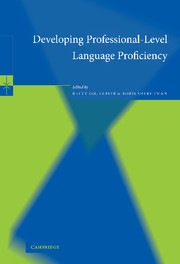Book contents
- Frontmatter
- Contents
- Notes on contributors
- Foreword
- Acknowledgments
- I Principles, practices, and theory
- II Programs
- 3 Contexts for advanced foreign language learning: a report on an immersion institute
- 4 Bridging the gap between language for general purposes and language for work: an intensive Superior-level language/skill course for teachers, translators, and interpreters
- 5 Learning Chinese in China: programs for developing Superior- to Distinguished-level Chinese language proficiency in China and Taiwan
- 6 Developing professional-level oral proficiency: the Shekhtman Method of Communicative teaching
- 7 The LangNet “Reading to the Four” Project: applied technology at higher levels of language learning
- 8 In the quest for the Level 4+ in Arabic: training Level 2–3 learners in independent reading
- 9 Teaching high-level writing skills in English at a Danish university
- 10 Heritage speakers as learners at the Superior level: differences and similarities between Spanish and Russian student populations
- 11 Teaching Russian language teachers in eight summer Institutes in Russian language and culture
- III Learners and users
- References
- Index
8 - In the quest for the Level 4+ in Arabic: training Level 2–3 learners in independent reading
Published online by Cambridge University Press: 03 December 2009
- Frontmatter
- Contents
- Notes on contributors
- Foreword
- Acknowledgments
- I Principles, practices, and theory
- II Programs
- 3 Contexts for advanced foreign language learning: a report on an immersion institute
- 4 Bridging the gap between language for general purposes and language for work: an intensive Superior-level language/skill course for teachers, translators, and interpreters
- 5 Learning Chinese in China: programs for developing Superior- to Distinguished-level Chinese language proficiency in China and Taiwan
- 6 Developing professional-level oral proficiency: the Shekhtman Method of Communicative teaching
- 7 The LangNet “Reading to the Four” Project: applied technology at higher levels of language learning
- 8 In the quest for the Level 4+ in Arabic: training Level 2–3 learners in independent reading
- 9 Teaching high-level writing skills in English at a Danish university
- 10 Heritage speakers as learners at the Superior level: differences and similarities between Spanish and Russian student populations
- 11 Teaching Russian language teachers in eight summer Institutes in Russian language and culture
- III Learners and users
- References
- Index
Summary
Arguments are made here that, in learning foreign languages, achieving independence at Level 2–3, particularly in reading, is a prerequisite for generating the power necessary for breaking away from the learning plateau characteristic of that level and continuing to Level 4 and beyond. Achieving such independence can, under the proper conditions, be realized through the effort of the learners themselves. The experiment in Independent Reading (IR) outlined below (which took place between 1970 and 1977) was based on several considerations. Important among these were (1) the centrality of reading in foreign language acquisition, (2) the nature of Arabic as a polyglossic language, (3) the bi-polar competence of the educated Arab as the model for the educated foreign learner, and (4) a suggested strategy for learning polyglossic Arabic. The course on independent reading was taught at the Center for Arabic Study Abroad (CASA) as a part of a full-year program in Advanced Arabic to American graduates at the American University in Cairo. This chapter discusses that course within the following framework: (1) preliminary considerations, (2) the CASA program, and (3) a detailed description of the course itself.
Preliminary considerations
Centrality of reading in foreign language acquisition
Experience shows that adults seriously seeking to learn foreign languages to high levels of proficiency have had, as a rule, significant amounts of formal education, i.e., are either college graduates or undergraduates. For such people, the printed word will have become, at this stage of their development, of paramount importance in their pursuit of knowledge.
Information
- Type
- Chapter
- Information
- Developing Professional-Level Language Proficiency , pp. 156 - 176Publisher: Cambridge University PressPrint publication year: 2002
Accessibility standard: Unknown
Why this information is here
This section outlines the accessibility features of this content - including support for screen readers, full keyboard navigation and high-contrast display options. This may not be relevant for you.Accessibility Information
- 1
- Cited by
